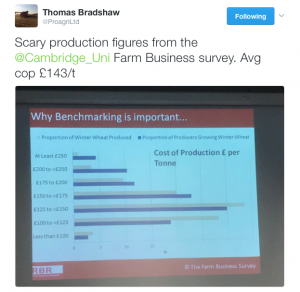The prominence of benchmarking is certainly not abating in 2017. You would have to buried, in arable land of course, and pretty deep, not to know that the information and action generated by good benchmarking can be the best boost to performance that a business can get, especially in these turbulent times.

Evidence of costs of production makes “scary” reading in Farm Business Survey is the tweet by Essex farmer, Tom Bradshaw, Essex
Survey reveals proportion of farmers wide of the mark
The Farm Business Survey published this month makes special mention of benchmarking. Farmers watching online and through social media as the comparison of costs being published could not help but share their surprise.
“Scary production figures”, tweeted Tom Bradshaw “Average costs of production are £143/tonne”.
The gap between costs and returns is alarmingly wide for many. Benchmarking is the first step in closing the gap.
Cope with prices at £100/tonne
“Every farmer needs to be able to cope with cereal prices at £100/tonne.” warns JVFG consultant Jamie Gwatkin. He was talking with farmers and others attending the AGM of The Morley Agricultural Foundation (TMAF) in Norfolk.
“Everything is focussing on getting costs of production down. Yes, prices have recently recovered a little. But the fact remains that we are entering a period of tremendous volatility. Every business has got to reduce costs.”
Benchmark with the best
Three new businesses have joined JVFG. The urge for them to reduce costs, and join the benchmarking group that is at the top of the league, was irresistible. Now the counties of Cambridgeshire, Shropshire and Hampshire join all the others in the network which is rapidly spreading across England.
The penalty if ‘look away now’
It is good that the results of benchmarking are plain to see. It is great to hear of the farmers who monitor expenditure closely. It is wonderful that by comparing their costs with the results of other businesses that they then know how and where to cut unnecessary spending.
There will of course be those farmers who choose to “look away now”. But theirs are the businesses unlikely to be able to cope in future. Benchmark or business as usual? The choice, with JVFG, is obvious.

